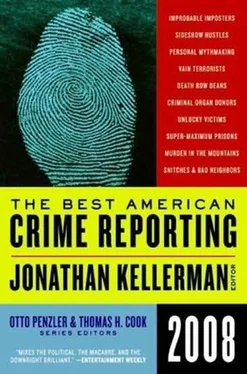No, I said, he didn’t. It’s not on his résumé, either, those twelve years representing the gap only his handler could explain. But wait a second-didn’t he go by Zeke?
“Oh, I don’t know where he got that,” she said. “Everybody I know calls him Bill. But then he went on that trip to El Salvador and everything changed. He was always big into skydiving, and though we didn’t have a lot of money, he wanted to go skydiving with the El Salvadoran army. I let him go, because it was so important to him, and that’s where he met Dennis Collins. And when he came home, he wanted me to call him Zeke. I couldn’t do it. He’s still Billy to me.”
Their finances got better after that, Linda said, because Bill started doing work for Dennis, and the work for Dennis led to work for the DOE, and the work for the DOE led to work for security companies like Vance and Blackwater. What got worse was Bill’s…well, his problem, Linda said. He has to make himself more interesting than he is. He can’t bear to be just plain old Bill Clark from Tulare, California, because plain old Bill Clark had dyslexia, and really suffered in school…
“Did he ever play football?” I asked.
“Junior varsity,” she said. “He was too small for varsity.”
Well, was he ever in Afghanistan or Iraq? I asked.
“Oh, heavens no,” Linda said. “He told you that?”
“He also told me that he was in the Horn of Africa with the French Foreign Legion.”
“Well, he did go to Nigeria, back in the early eighties. A Nigerian minister came to Tulare, and Bill went to Nigeria with him as a missionary. He didn’t like it very much, though. He came back in about two or three weeks.”
She said this without malice. Indeed, she was praying for him to see the error of his ways, so that their marriage could be repaired and they could reconcile. She still loved the man. She still spoke to him. As a matter of fact, she had spoken to him just the day before, and he was saying that he wanted to break off his engagement with Terri so that he could remarry Linda.
“Linda, I hate being the one to tell you this, but he and Terri aren’t engaged. They’re married.”
“Oh, my God,” Linda Clark said.
AN OFFICIAL at one of Zeke’s former employers confirmed that he did have a Q clearance with the DOE, which gave him access to top-secret information at nuclear plants. But when two officials with access to Department of Defense databases-one in the DOD, the other a screener for a private security company-checked Zeke’s TS/SCI clearance, they found no record of William E. Clark having DOD “eligibility or access.” That is, they found no record of William E. Clark holding the high-level DOD security clearance he included on his résumé at Palisades Nuclear.
HE HAD NEVER TALKED about his life before, Zeke said, and he was always disdainful of people who did. He was always disdainful of both the “cowboys” who liked to brag and the “wannabes” who were endemic to the world of covert operations. Real operators, he said, never talked about their exploits when they got together. They talked about their wives, they talked about their families, they talked about how much they missed home. It was strange, then, that about seven years ago he held the ultimate wannabe job-he was an auxiliary cop in Kingsburg, California, an unpaid position that called on him only to “assist officers on duty.” And it was even stranger when, last year, he called a cop he knew from Kingsburg named Kevin Pendley. “He tried to recruit me to go to Iraq,” Pendley says. “He called out of the blue. He said he’d been over there for Blackwater and that he’d just gotten back. He said he killed sixty-nine people.”
RICK CLARK KNEW instinctively that his father had remarried. He had, in fact, warned his mother that his father had remarried, although he hadn’t spoken to his father in a year and a half. It was just something he felt, from a lifetime of experience-the familiar vibrations of his father’s falsehoods. “He’s living a movie in which he’s the flawed but sympathetic central character, a really deeply interesting central character,” Rick said. “He’s smart enough to show his flaws, because when he does, he becomes believable, and you become an accomplice in the movie of his life.”
Was Rick one of Bill Clark’s accomplices? “I grew up with the mythology and to some extent defined myself by it,” he said. “One of the reasons I went into the military was to carry on the tradition.” Rick is thirty-five now, about to leave the Air Force, and he doesn’t consider himself an accomplice anymore. “If my father told me the sun was shining, I wouldn’t believe him-even if I lived in the next town over, for God’s sake.” But he did want to know one thing. He wanted me to find out the truth of one story, because he’d been hearing it since he could remember and had built his life around it. He wanted to know if Bill Clark had been a Ranger and had been in Vietnam. “I really need to know that, Tom,” he said. “Because I need to know whether everything has been a lie.”
THERE WAS NO INCIDENT on Zeke’s first day at Palisades; no threat to throw his boss out the window. That’s what the senior manager said, the same one who had told me that Zeke had gone to Afghanistan looking for a high-velocity round between the eyes. When I told him that Zeke had never actually been to Afghanistan or Iraq, he said, “He wasn’t ?” And then he said, “You know, I’m really glad you called, because he’s been trying to get me to quit my job and go into business with him. He said that I had the know-how, and he had all the contacts from his years in covert operations.”
THE MOVIE WAS CALLED Team Dragon. Bill Clark got the idea for it when a B-movie company came to Tulare to reshoot some footage on the cheap, and he went out to get some stunt work. He thought it looked pretty easy, making a movie, so he started watching movies obsessively on his VCR, with a notebook in his lap. When he felt ready to direct, he began shooting bits of a script he’d written, featuring guys he knew from Tulare. One of them, Ken Washman, was bothered by the suspicion that if what Clark was shooting ever did become a movie, he wouldn’t get paid a dime, and so he began asking Clark what it would cost to get cut in-to make a real movie whose profits he could share. Clark came up with a figure, which happened to be the amount of the check Washman had recently received in compensation for a workplace accident. And so, in 1990 and 1991, Bill Clark shot Team Dragon in and around Tulare, with Ken Washman as his star. It was about a Vietnam veteran who had to face his demons when he found out that the NVA was selling opium in California, and it cost $25,000 to make. “My wife wasn’t real happy about it,” Washman says now. “She didn’t really like me spending that much time with Bill Clark, and she wanted me to put the money in a piece of property or something. I guess I would have had a better return on my investment if I did, but I wouldn’t have had as much fun as I did running around and shooting guns out there in Tulare. And it was a real movie, you know. We had a premiere at the Elks club in Tulare. Bill showed it and said, ‘Well, Ken, what do you think?’
“I said, ‘Well, Bill-it’s a movie.’ There was not a whole lot much more you could say about it, other than that.”
ZEKE DIDN’T KILL anyone in Louisiana. A former marine who was on Zeke’s Blackwater team said that no one even discharged his weapon, because it was well known that if you did, Blackwater would fire your ass. Besides, they were in the sticks. They weren’t in New Orleans. It was quiet where they were, really sort of boring, except when Zeke told the story that a gang was coming to get at the narcotics. Even then, the former marine listened with half an ear. That guy was always telling stories.
Читать дальше












